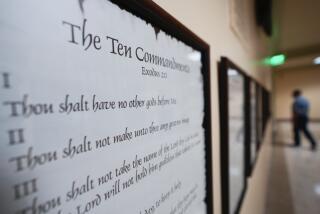They’ve Fallen Off the Top 10 List
- Share via
During the debate over removing a 2-ton monument featuring the Ten Commandments from the rotunda of the Alabama Supreme Court, it has been repeatedly asserted that “America was built on the principles of the Ten Commandments” and that our system of government is based on the Decalogue. The opposite is much closer to the historical truth. As Thomas Jefferson --who rejected the divine origin of the Ten Commandments and found them to be “defective and doubtful” --recognized, our nation was founded on a rejection of much of what is in the actual content of the commandments.
Most Americans are unaware of what is included in the nearly 300 words that make up the Ten Commandments as set out in Exodus and Deuteronomy and translated in the King James (and other) versions of the Bible. They know only the CliffsNotes version: “Thou shalt not kill” (or “murder,” depending on which translation one accepts); “Thou shalt not commit adultery,” which, in its time applied only to married women, not married men, who were free to have sex with unmarried women; and “Thou shalt not steal” or “bear false witness.”
In theory at least, all civilized societies recognize those ancient principles, which aren’t original to Mosaic law. They are based on earlier laws, such as the Code of Hammurabi and the Code of Lipit-Ishtar. Can it be said then that the United States is based on pagan codes?
The complete text of the Ten Commandments, regardless of the translation, is much more controversial. It includes God’s assertion that he is “a jealous God” and his threat to visit “the iniquity of the fathers upon the children unto the third and fourth generation” --that is, to punish children, grandchildren and even great-grandchildren for the sins of their ancestors.
Can anything be more un-American? Jefferson agreed with Thomas Paine that this commandment is “contrary to every principle of moral judgment.” As my 13-year-old daughter has observed, how can a child be expected to “honor thy father and thy mother” if her evil parents are responsible for punishment she and her innocent children and grandchildren will suffer? The principle of intergenerational collective accountability is particularly unsuited to a nation that proclaimed itself a land of individual opportunity and rejected the European tradition of class based on parentage.
Nor does the U.S. accept the notion of having “no other gods” except the Judeo-Christian god. We have always welcomed people who have other gods, or no god. And we constantly take God’s name in vain by invoking it at sporting events, on our money, in political campaigns and with all-American curses.
The full text of the commandments seems to accept slavery, given that in the original Hebrew it condemns coveting your neighbor’s “slave” --usually mistranslated as “servant” or “manservant.” Moreover, coveting is as American as apple pie. Our entire market system encourages us to covet our neighbor’s wealth.
The commandments also provide for a day of rest for “thy slave.” And speaking of a day of rest, the commandments are unambiguous about which day is mandated, as well as the reason for it: It is the “seventh day” --Saturday --because God “rested the seventh day.” It is not Sunday, the day selected centuries later by Christians because it is the day on which Jesus was resurrected. That choice was rejected by Jews and Seventh-day Adventists, while Muslims selected Friday as their day of rest.
Finally, there is the prohibition of “graven images” --a phrase that seems to describe the large monument in Alabama before which so many people have prostrated themselves in recent weeks.
So what is so American about the Ten Commandments? Nothing, I submit. The rules we accept actually precede the Ten Commandments and are accepted by all civilized nations. The remaining provisions --which call for punishing children for the sins of parents, acknowledge slavery, mark Saturday as the exclusive day of rest and were read as exempting married men from the prohibition against adultery --the United States has generally rejected.
Not only do the Ten Commandments not belong in public courthouses or classrooms, they do not even belong --at least without some amendments and explanatory footnotes --in the hearts and minds of contemporary Americans.
More to Read
Sign up for Essential California
The most important California stories and recommendations in your inbox every morning.
You may occasionally receive promotional content from the Los Angeles Times.










